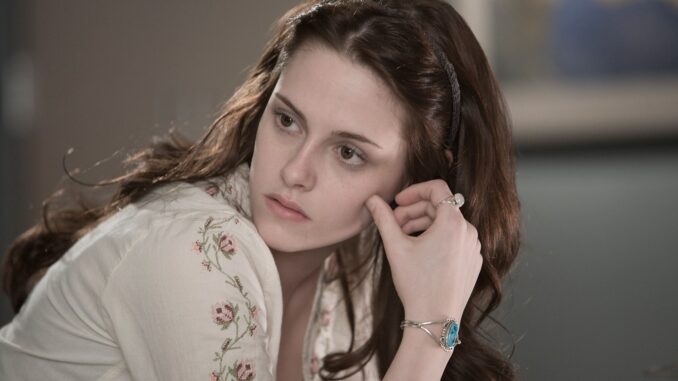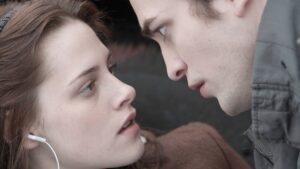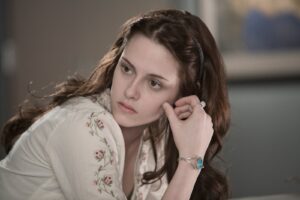
The Twilight Saga romanticised toxic relationships – so why is it getting a reboot?
Hollywood is clearly in its reboot era and – for the most part – we’re not mad. But The Twilight Saga returning as a TV series? Absolutely not.
Lately, we’ve been spoilt for choice when it comes to complex female characters – from superhero scientists to long-overdue redemptive arcs for unfairly maligned villains. Perhaps I’m being cynical, but there’s something disturbing about rebooting such a problematic show – with all its overt themes of internalised misogyny, toxic relationships, and racism – to a new generation of teens.
In case you need a refresher, The Twilight Saga is a series of books written by Stephanie Meyer, (first released in 2005 with Twilight; ending in 2008). The books were adapted to become one of the most successful movie series of all time, launching Kristen Stewart, Robert Pattinson and Taylor Lautner into the mainstream – and they’ve not left yet.

The story surrounds Bella Swan who falls in love with a 104-year-old vampire in Edward. She is also caught in a love triangle with werewolf Jacob Black who is also obsessed with this ordinary (but obviously not so ordinary!) teenage girl. I was Team Edward – between this and Vampire Diaries – the idea of being young and pretty forever was more appealing. But then my frontal lobe began developing, and I realised that as a young woman, Twilight is incredibly toxic, and we really do not need that again.
Now, I am not saying that people get into toxic relationships because they watched or read Twilight. But Meyer’s idealised love story is one that requires a girl to give up everything about her identity and ignore all manners of red flags – from tracking their partner’s movements and watching them in their sleep to obsessive jealousy.
Bella Swan is the sort of protagonist who should remain in the early 2000s – the ‘not like other girls’ – who dislike other women for existing.
She’s quirky; she hates pink and dresses and doesn’t wear makeup. Not like her friend Jessica (portrayed iconically by Anna Kendrick), who is often maligned in her introspection in the books.
Now being an outcast is not a bad thing – no girl can in fact be like the other girls. However, putting down other girls because you are not like them is not something that makes you a better person.
The other women within the series are rarely given any depth, and when they are, it is to prop up Bella, who still does not really respect them or to act as a contrast to highlight how much ‘better’ Bella is. And then she’s apparently a feminist icon because she chooses her path, according to Meyer.
Edward is controlling and possessive towards Bella. He stalks her, isolates her from her friends and family, and even destroys her car to prevent her from seeing her best friend.
“If Edward Cullen wasn’t a pretty vampire, we’d call the police and tell Bella to leave him.”
If Edward wasn’t a pretty vampire, we’d call the police and tell Bella to leave him. But these are all presented as signs that he loves her and wants to protect her.
Jacob Black, Bella’s other love interest, is a member of the Quileute Tribe. He also happens to be a werewolf.

A Native American tribe with a very real presence in Forks, made famous by the books and native mythology, provides a backbone for the werewolf lore in the series. However, the tribe has pointed out the inaccuracies that have persisted because of Meyer’s work, and they received no compensation for the appropriation of their culture and history.
Jacob and his pack are often portrayed as shirtless, animalistic, and unable to ‘behave’. Even how Jacob expresses his feelings towards Bella, including a forced kiss, plays into the very troubling trope of having a man of colour encroaching on an innocent white womanThis is in stark contrast to the vampire, a white male, who stalks her and wants to keep her a virgin until marriage.
A reboot could rectify these issues. But do we really need to return to the online fandom wars that will undoubtedly aim racist ire towards actors of colour?
“I think it’s a symptom of studios and streamers trying to tap into nostalgia for our generation not realising that those cultural artefacts are now untouchable.” Ayan Artan, a screenwriter and culture journalist tells GLAMOUR. “The original is already there, and so we the fans are highly likely to not pay any [positive] attention to a reboot because the original is still so accessible to us.”
“There’s been talk of recasting characters with BIOPIC actors, but I don’t see why they should do that.” She continued, “You want Black vampires? Fund Black vampire films and TV shows. Adapt the dozens of books that live in that realm by writers who have something new to contribute!” I can’t help but agree.
Reboots are becoming a dime a dozen in Hollywood. Aside from all the money that will be made from this, I also wonder if there is an attempt to glorify an old, more pliant, mode of femininity – in contrast to the strong, complex female characters we’ve come to expect.